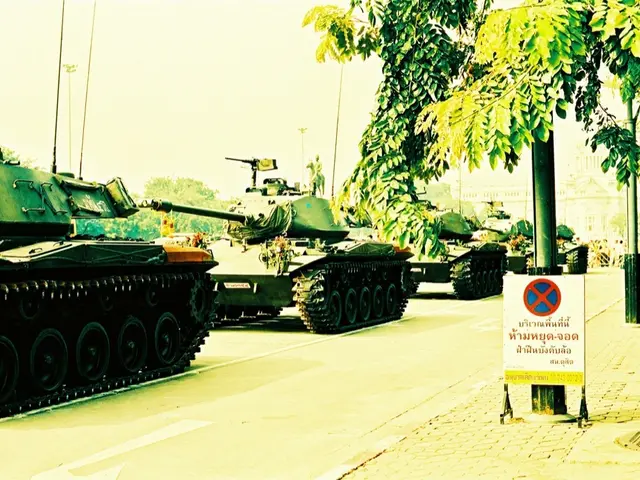Ministry denies allegations of external influences on oil production output.
Fresh Take:
The ministry emphasizes the importance of working with partners within the OPEC+ agreement, viewing it as a vital instrument in keeping the global oil market stable. This comes as Kazakhstan grapples with an economic slump and a weaker tenge, due to tumbling oil prices.
In the grand scheme of things, OPEC+ is becoming increasingly influential in influencing oil market stability amidst economic tribulations like those facing countries such as Kazakhstan.
OPEC+ Production Strategy and Market Balance
OPEC+ is speeding up its plan to unwind past production cuts, cranking out an additional 411,000 barrels per day (bpd) in June 2025. Originally, the monthly increase was set at just 138,000 bpd. This bold move aims to gradually reinstate global oil supply that was previously slashed by 2.2 million bpd over an 18-month period, but is now ramping up at a quicker pace to adapt to shifting market scenarios[1][3][4].
By doing so, OPEC+ is essentially taking the offensive against competitors such as U.S. shale producers, as it navigates a less robust global economic outlook and more subdued oil prices. In essence, Saudi Arabia—OPEC+'s leader—is showing signs of confidence in withstanding lower oil prices without needing to enact additional output cuts, hinting at a shift towards focusing on market stabilization over targeting high prices[1].
Monthly discussions among OPEC+ countries help determine market conditions, quota compliance, and even compensation for overproduction, granting the group flexibility to halt or reverse production increases when needed in the pursuit of market stability[4].
Kazakhstan’s Challenges
A member of OPEC+, Kazakhstan is bound to production quotas. The OPEC+ construct serves to preserve production discipline and prevent oversupply that could worsen prices and hurt oil-dependent economies like that of Kazakhstan. As Kazakhstan copes with an economic downturn and tenge depreciation, maintaining oil prices stability and applying production restraint via OPEC+ collaboration is essential to shield the country from additional hardships[1].
The hasty quota increase, paired with an emphasis on overproduction compensation, seeks to prevent members like Kazakhstan from exceeding production limits, minimizing turbulent market volatility that might intensify currency depreciation and economic difficulties[4].
Global Market Repercussions
While this production increase has caused some oil price declines, with analysts lowering their Brent crude forecasts, the coordinated management of OPEC+ supply helps prevent severe price fluctuations that could potentially upend the global oil market during challenging economic times[2].
To summarize, OPEC+ is employing a flexible approach to carefully calibrate production increment adjustments, enforce quota discipline among participating countries like Kazakhstan, and in doing so, uphold relative stability in the global oil market. This coordinated approach becomes increasingly critical as Kazakhstan confronts economic hardships and tenge depreciation, safeguarding the country’s economy from further volatility emanating from oil market dynamics[1][4].
- I, as an analyst, believe that the collaboration with OPEC+ is crucial for Kazakhstan's finance and energy industry, as it aims to maintain stability in the global oil market, which is particularly important given the current economic slump and weaker tenge that Kazakhstan is experiencing due to tumbling oil prices.
- The increased production strategy by OPEC+, despite causing some oil price declines, is designed to prevent severe price fluctuations that could potentially destabilize the oil market during challenging economic times, thereby shielding oil-dependent economies like Kazakhstan from further economic hardships.
- Given that Kazakhstan is a member of OPEC+ and bound to production quotas, the OPEC+ construct serves as a vital instrument in preserving production discipline and preventing oversupply, which could worsen prices and create additional hardships for oil-dependent economies like Kazakhstan.
- By maintaining oil prices stability and applying production restraint via OPEC+ collaboration, Kazakhstan can ensure a measure of stability for its economy that is heavily reliant on the oil-and-gas industry, thereby safeguarding the country from further volatility emanating from oil market dynamics.
- I project that OPEC+, with its flexible approach to production increment adjustments and strict quota discipline among participating countries, will continue to play a vital role in preserving stability in the global oil market, especially for oil-dependent economies like Kazakhstan.








